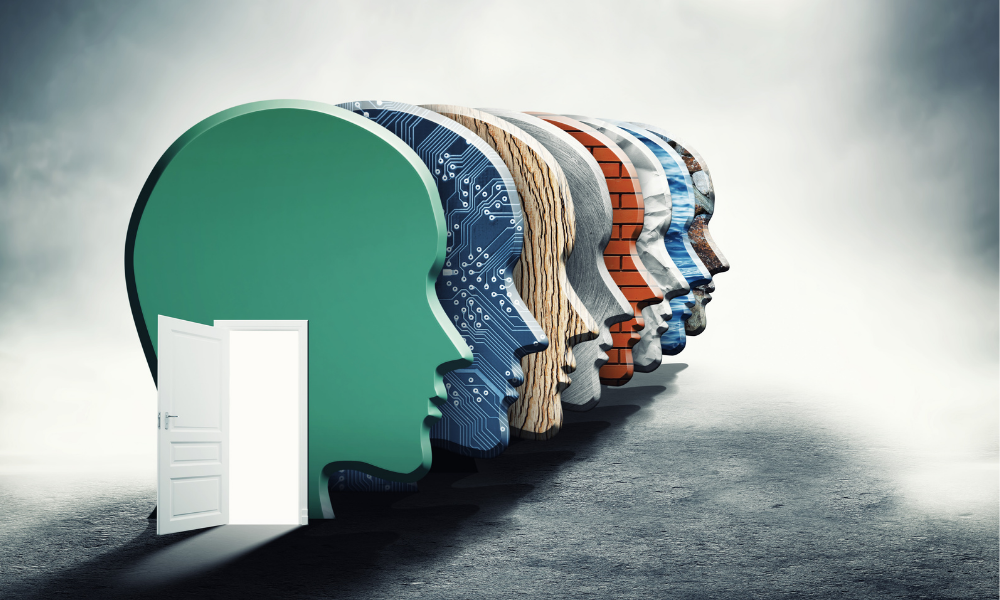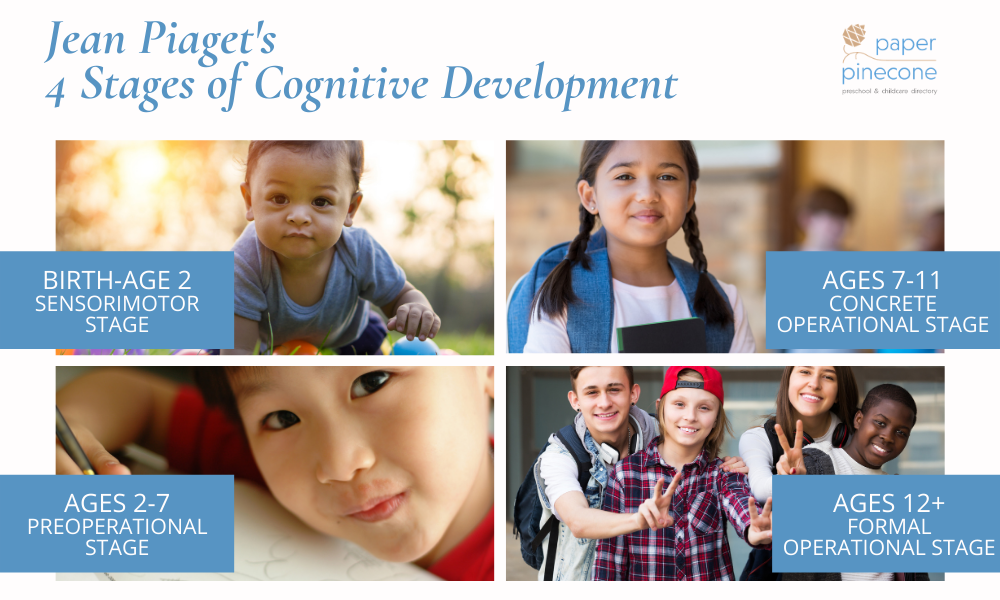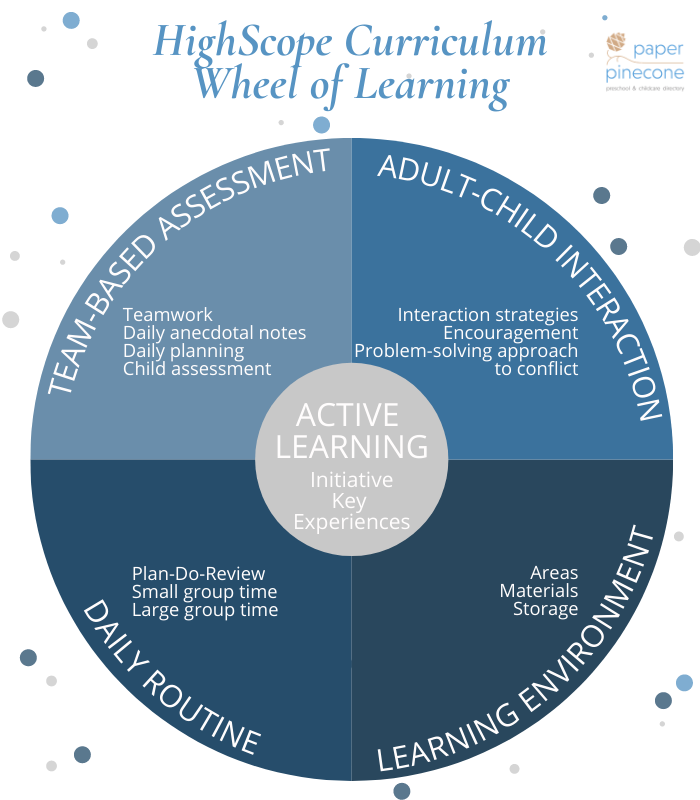Jean Piaget’s 4 Stages of Cognitive Development in Simple Terms

Published Date: 03/15/21
An Overview of Jean Piaget's 4 Stages of Cognitive Development
Jean Piaget was a Swiss psychologist who specialized in the study of cognitive development in children. During his career, he developed a theory that helps explain how children develop and experience the world around them through various stages. Piaget believed that children learn lessons through repeated experience building on the knowledge they have.
One key element of his theory is that children have access to the same amount of information their entire lives. The only thing that changes is their ability to process, understand, and interact with that information.
What are the Core Theories of Piaget’s 4 Stages of Cognitive Development?
Piaget proposed that there are four stages of cognitive development in children:
Birth to 2 years – Sensorimotor Stage
Ages 2 to 7 – Preoperational Stage
Ages 7 to 11 – Concrete Operational Stage
Ages 12 and Up – Formal Operational Stage
While he laid out specific ages in his theory, these are approximate, as every child develops at a different pace.
Birth to 2 Years – Sensorimotor Stage
When babies are born, most of their behaviors are driven by instinct. These instincts are limited to just a few actions including crying at the sense of discomfort or pain, sucking on objects in their mouth, and following moving objects with their eyes.
During this first stage, the child goes through a tremendous amount of growth and development. They become aware of their senses and start to experiment. Through interaction with their environment, they begin to form how they view the world around them and how some actions create reactions. This is the time when they start becoming aware that they are a separate being from the other people and objects around them.
The child also starts to develop motor skills. They start with grasping and reaching for objects. Eventually, they develop the ability to crawl and walk.
The foundation of language skills is also important at this stage. The child learns to mimic basic sounds that they hear around them. Before long, they start to associate those sounds with people and objects. Finally, they learn that the use of certain sounds and words can elicit responses from other people.
RELATED: READ ABOUT MILDRED PARTEN'S SOCIAL BEHAVIOR THEORY OF PLAY
Ages 2 to 7 - Preoperational Stage
During the preoperational stage, language continues to develop. The child can form more complex sentences and can express themselves. For example, children in this stage will be able to express that their stomach hurts rather than simply crying because of pain they couldn’t describe before.
While their language skills are much improved during this stage, the child will not be able to think about things in abstract terms. Everything will be literal. If you tell a child at this age that it is “raining cats and dogs”, you will likely get a puzzled look.
Children during this stage may be egocentric and find it difficult to see things from another’s perspective. One of the most common examples is sharing. A child during this stage may not be aware of how they make the other kids feel when they hog all the toys.
Ages 7 to 11 – Concrete Operational Stage
At this stage, children still think in literal terms, but they will start applying logic to their thought process. For example, learning that a tall, skinny glass will hold the same amount of water as a short, wide glass. Their problem-solving skills further develop as they learn to test ideas through trial and error.
Egocentrism starts to fade away and children become more aware of other people’s perspectives and feelings. This is the time when they begin to form many close friendships with children their age.

Ages 12 and Up – Formal Operational Stage
During the final stage of development, the formal operational stage, a child’s thought process becomes more advanced. Children start to develop the ability to think about things in abstract terms or hypothetical situations. They develop an awareness of and think about moral, philosophical, and ethical concepts.
ALSO READ: HOW TO RAISE RESILIENT CHILDREN
Not only are children at this age able to understand complex subjects, but they are also able to express those concepts to others.
How did Piaget’s Work Influence the HighScope Preschool Curriculum?
Piaget’s Stages of Cognitive Development, along with the progressive educational philosophy of John Dewey helped form the foundation of the HighScope Preschool Curriculum. Since its inception it has evolved to include components from other constructivist models, drawing on the work of Lev Vygotsky and others and, according to HighScope.org, maintains “that children actively “construct” their understanding of the world based on their experiences and social interactions, rather than just passively receiving knowledge and skills from adults.”
What are the Five Principles of the HighScope Curriculum?
There are five principles of the HighScope Curriculum that are depicted in a wheel of learning. They are:
- Active Learning – At the center of the wheel
- Initiative
- Key experiences
- Adult-Child Interaction
- Interaction Strategies
- Encouragement
- Problem-solving approach to conflict
- Learning Environment
- Areas
- Materials
- Storage
- Daily Routine
- Plan-Do-Review
- Small group time
- Large Group time
- Team-Based Assessment
- Teamwork
- Daily anecdotal notes
- Daily planning
- Child assessment
Supporting Children Through Their Development
Children don’t process information the same as adults. As they encounter things for the first time or have new experiences, their view of the world will change. As parents and childcare providers, it’s important to identify these phases to better understand how you can support their growth and development. Most importantly, allow them the freedom to try new things and have the experiences they need to develop these critical cognitive abilities.
Paper Pinecone is the #1 most trusted childcare directory giving parents access to the best preschools and best daycares near you. Parents always search free and childcare providers always list free. Send inquiries about the best daycares and preschools to [email protected].
- stacey's blog
- Log in or register to post comments



